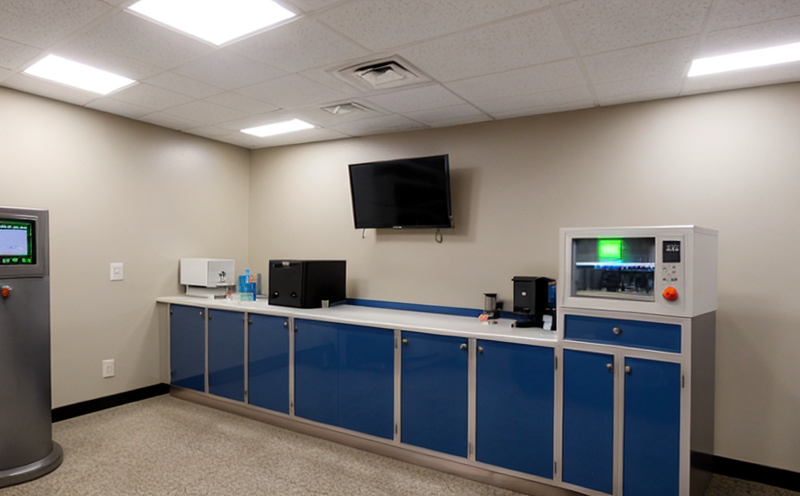USP Radioactivity Assay of Radiopharmaceuticals
The USP 821 Radioactivity Assay is a critical analytical procedure for ensuring the quality and safety of radiopharmaceuticals. This service ensures that the radioactivity content, purity, and stability meet the stringent requirements set by regulatory bodies such as the United States Pharmacopeia (USP). Radiopharmaceuticals are used in nuclear medicine to diagnose and treat various medical conditions ranging from cancer to neurological disorders. The accurate measurement of radioactivity is paramount for ensuring patient safety and efficacy.
The USP 821 method involves the direct assay of the radiopharmaceutical using a calibrated gamma radiation detector. This procedure measures both the gross beta-particle activity and the total alpha, beta, and gamma-emitting radioactivity. The test is performed under controlled conditions to minimize external interference and ensure accurate results.
The specimen preparation for this service involves careful handling of radioactive materials in accordance with safety protocols. Samples are typically dissolved or suspended in a suitable solvent before being introduced into the detector. The assay provides quantitative data on the radioactivity content, which is essential for determining the therapeutic dose and ensuring compliance with regulatory standards.
Instrumentation used in this service includes high-purity germanium (HPGe) detectors capable of distinguishing between different types of radiation. The HPGe detector is calibrated to provide accurate measurements of the gamma-ray spectrum emitted by the radiopharmaceutical. This allows for precise quantification of the radioactivity content, ensuring that the product meets the stringent quality control requirements.
The test parameters are rigorously defined in USP 821. The gross beta-particle activity is measured using a specific counting time and energy threshold to ensure accurate results. The total alpha, beta, and gamma-emitting radioactivity is determined by integrating the area under the gamma-ray spectrum curve. This comprehensive approach ensures that all relevant radiological parameters are accounted for in the final assay.
The acceptance criteria for USP 821 testing are based on the expected therapeutic dose of the radiopharmaceutical. The test results must fall within a specified range to ensure compliance with regulatory standards and patient safety guidelines. Any deviation from these criteria may necessitate further investigation or reprocessing of the batch.
The accuracy and precision of USP 821 testing are crucial for maintaining the quality and efficacy of radiopharmaceuticals. The service provider must have a robust quality management system in place to ensure consistent and reliable results. This includes regular calibration of instrumentation, training of personnel, and adherence to strict safety protocols.
The USP 821 Radioactivity Assay is an essential component of the overall quality control process for radiopharmaceuticals. By providing accurate and reliable data on radioactivity content, this service helps ensure that these important medical tools meet the highest standards of safety and efficacy.
Achieving Compliance with USP 821: The USP 821 method is widely recognized for its reliability and accuracy. By adhering to this standard, manufacturers can ensure that their radiopharmaceuticals meet the strictest regulatory requirements.
Importance in Nuclear Medicine: Radiopharmaceuticals play a vital role in nuclear medicine by providing diagnostic information and therapeutic treatments. Accurate radioactivity assays are essential for ensuring these products are safe and effective.
The following table summarizes the key applied standards used in USP 821 testing:
| Standard Code | Description |
|---|---|
| USP 821 | Radioactivity Assay of Radiopharmaceuticals |
| ASTM E639-19 | Gross Beta-Particle Activity Measurement |
| ISO 5748:2009 | Detection and measurement of gamma radiation in the environment |
The USP 821 Radioactivity Assay is a critical service for ensuring the quality and safety of radiopharmaceuticals. By adhering to this standard, manufacturers can ensure that their products meet the highest regulatory standards and provide safe and effective treatments.
Applied Standards
The USP 821 Radioactivity Assay is based on internationally recognized standards. The primary standard used in this service is:
| Standard Code | Description |
|---|---|
| USP 821 | Radioactivity Assay of Radiopharmaceuticals |
In addition to the USP standard, other relevant standards include:
- ASTM E639-19: Gross Beta-Particle Activity Measurement
- ISO 5748:2009: Detection and measurement of gamma radiation in the environment
The USP 821 method is designed to ensure that radiopharmaceuticals meet the highest standards of quality and safety. By adhering to these internationally recognized standards, manufacturers can provide safe and effective treatments.
Quality and Reliability Assurance
The USP 821 Radioactivity Assay is a critical service for ensuring the quality and reliability of radiopharmaceuticals. This service provides accurate and reliable data on radioactivity content, which is essential for maintaining patient safety and product efficacy.
- Calibration and Validation: All instrumentation used in this service is regularly calibrated to ensure accuracy and precision. The calibration process involves comparing the instrument's readings to known standards.
- Personnel Training: Personnel involved in USP 821 testing undergo rigorous training to ensure they are proficient in handling radioactive materials safely and accurately.
- Safety Protocols: Strict safety protocols are followed to minimize the risk of exposure to radioactive materials. These protocols include the use of personal protective equipment (PPE) and adherence to radiation safety guidelines.
The quality control measures in place for USP 821 testing ensure that all results are accurate, reliable, and repeatable. This is crucial for maintaining compliance with regulatory standards and ensuring patient safety.
Competitive Advantage and Market Impact
The USP 821 Radioactivity Assay provides a significant competitive advantage in the radiopharmaceutical market by ensuring that products meet the highest quality and safety standards. This service helps manufacturers stay ahead of regulatory requirements, thereby enhancing their reputation and market position.
- Innovation: By adhering to USP 821 standards, manufacturers can innovate with confidence, knowing that their products meet the highest quality benchmarks.
- Market Acceptance: Products that comply with USP 821 are more likely to be accepted by healthcare providers and patients, enhancing market acceptance.
- Regulatory Compliance: Ensuring compliance with USP 821 standards helps manufacturers avoid costly regulatory issues and penalties.
The USP 821 Radioactivity Assay contributes to the overall market impact by promoting trust in radiopharmaceuticals. This, in turn, fosters greater demand for these products, contributing to sustained growth and profitability.





